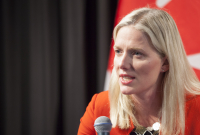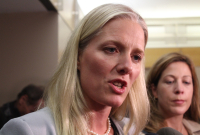Support strong Canadian climate journalism for 2025
Saskatchewan Premier Brad Wall says Prime Minister Justin Trudeau should look south of the border before implementing a carbon tax in Canada.
Wall said the climate change plan released this week by U.S. presidential candidate Hillary Clinton supports investments in energy efficiency, cleaner fuels and carbon capture, but does not include a carbon tax.
"When I take a look at Hillary Clinton’s climate change plan, I wish Justin Trudeau was a little more like Hillary Clinton," Wall said Wednesday.
"Her plan is very serious about battling climate change, I would say. She’s got a real focus on technology."
The plan Trudeau announced last week calls for a $10 dollar per tonne tax on carbon starting in 2018, increasing to $50 dollars per tonne by 2022. Trudeau also warned that carbon pricing will be imposed on provinces that don’t implement the tax or bring in a cap−and−trade system.
Trudeau’s carbon pricing scheme would put Canada’s economy at a disadvantage with its largest trading partner, Wall said.
"Before we rush to a final decision on what we’re going to do on taxing carbon or pricing carbon or the timeline, shouldn’t we be aware at least of what the Americans are going to do," he said.
"We’re part of the North American integrated market. We need to know if anything that we’re going to do unilaterally in Canada will make us less or more competitive."
Canada generates 1.6 per cent of the world’s greenhouse gas emissions. Saskatchewan accounts for 10 per cent of the Canadian amount, about 75.5 million tonnes annually.
The Saskatchewan government passed its own legislation in 2010 to tax heavy emitters, with the money to go back into a technology fund to help find ways to reduce emissions. However, the legislation was never brought into force.
Wall has championed carbon capture and sequestration, the trapping underground of carbon dioxide generated by power plants and other sources.
Saskatchewan opened a $1.5 billion carbon capture facility at a coal−fired power plant in 2014.
"That plant is burning 10 times cleaner than any coal plant in the world," he said.
Wall also said SaskPower, the province’s Crown utility, plans to have half of Saskatchewan’s power come from renewable sources such as solar and wind by 2030.
The focus should be on innovation and technologies to reduce greenhouse gas emissions, he said. Wall noted that some 2,000 coal plants are being built around the world and need to be cleaned up.
Wall said that will be his message when all of the premiers meet next month and next week when he is to announce Saskatchewan’s plan to fight climate change.
"It’ll look more like Hillary Clinton’s plan than it will Justin Trudeau’s plan."
National Observer exists thanks to reader subscriptions and donations. Please subscribe today.






Comments